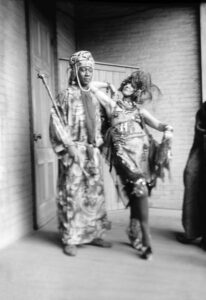
CALL FOR PAPERS
Diasporic Avant-Gardes Noir:
Blackness, Innovation, Futurity
American Comparative Literature Association
Chicago, 16–19 March 2023
To submit a proposal, click here
(deadline: October 31)
“Diasporic Avant-Gardes,” held at UC Irvine in 2004, brought together poets and critics of the African diaspora and Euro-American avant-gardes, published in 2009 as Diasporic Avant-Gardes: Experimental Poetics and Cultural Displacement (ed. Barrett Watten and Carrie Noland). Nathaniel Mackey, Fred Moten, Tracie Morris, Brent Hayes Edwards, Mark McMorris, and Kamau Brathwaite presented creative work; critical work included writing on Aimé Césaire, Brathwaite, Linton Kwesi Johnson, Franco Luambo Makiadi, and Harryette Mullen, and other avant-garde formations. Eighteen years since has seen an explosive emergence of innovative African American/Black diasporic avant-garde writing: Will Alexander, Tisa Bryant, Renee Gladman, giovanni singleton, Duriel E. Harris, Harmony Holiday, Douglas Kearney, John Keene, McMorris, Jonah Mixon-Webster, Julie Ezelle Patton, Tyrone Williams, and others in the 2015 anthology What I Say: Innovative Poetry by Black Writers in America (ed. Aldon Lynn Nielsen and Lauri Ramey), building on the 2006 Every Goodbye Ain’t Gone: An Anthology of Innovative Poetry by African Americans (ed. Nielsen and Ramey). The same period witnessed the emergence of avant-garde studies, in a global, transnational, and diasporic turn that radically expands the Euro-American avant-garde. In his important essay “Otherness: From Noun to Verb,” Nathaniel Mackey theorized Black improvisational or “free” musical forms in relation to “outness,” writing/imagining/playing “outside the box” that comprehends social outsiderness. Fred Moten has described Black creative practice as “in the break” of normative narrative or poetic forms, preserving rupture and discontinuity. More recently Duriel E. Harris calls for poets and performers to explore Black aesthetic practices that at-tend to active aural witnessing across concepts of time, environment, space, ability, embodiment, genre, and historical markers. How do these conceptions of African American/Black diasporic aesthetics chart new paths for avant-garde studies, in its present global moment? This seminar seeks papers at the intersection of radically innovative work by African American/diasporic Black writers, visual artists, or musicians, of multiple global regions or historical periods, that reference, critique, qualify, modify, add to, and/or contest the Euro-American history and theory of the avant-garde. Topics may include individual authors, artists (Jean-Michel Basquiat, David Hammons, Kara Walker), musicians (Albert Ayler, Anthony Braxton, Cecil Taylor), present or past; literary or artistic movements or groupings (Negritude, Black Arts, or Umbra but later AACM or Black Took); new modes of oral and musical performance and written and visual forms; and historical or theoretical connections between African American/Black diasporic artists and “what it means to be avant-garde.”
Lauri Scheyer, British and American Poetry Research Center,
Hunan Normal University (co-organizer)
Duriel E. Harris, English, Illinois State University (co-organizer)
Tracie Morris, Writers Workshop, University of Iowa (co-organizer)
Barrett Watten, English, Wayne State University (co-organizer)
To submit a proposal
Submit to ACLA by Monday, October 31 here
For ACLA portal, click here
Image
Claude McKay and Baroness Elsa von Freytag-Loringhoven, 1920. Photo: Library of Congress, public domain.












